by Leslie Layton
For Emma Harris, the past five weeks of pandemic have meant a hard hustle.
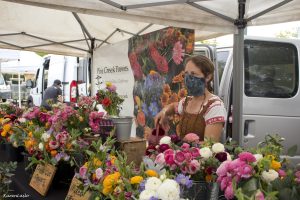
She’s had to fashion a new business model in just weeks to keep her Chico flower farm, Pine Creek Flowers, afloat.
As the pandemic set in, she saw that her market sales were going to plummet; the spring opening of the Thursday Night Market was postponed and the Saturday crowd at the downtown Farmers Market was smaller. She says she didn’t qualify for a loan from the Small Business Administration’s (SBA) Paycheck Protection Program; Pine Creek Flowers doesn’t have a payroll.
So Harris and her husband, Craig Piluso, quickly developed an online order and delivery service and offered a pop-up farm stand for bouquets and vegetable starts.
“It’s been stressful, but we are getting through this,” Harris said Saturday, wearing a mouth-and-nose covering and standing next to a table blanketed with fresh Ranunculus, many in sunset-colored hues.
“We’re doing well enough with the new model. I’m pretty tired, but the silver lining is that this has forced us to come up with creative new ways [of doing business.]”
During the 40 years it’s been a Saturday morning fixture in downtown Chico, Farmers Market has become a vehicle for family farmers, musicians and artists who have brought ethnic and creative diversity to what is otherwise, during the week, a municipal parking lot. Chico Certified Farmers Market (CCFM), the sponsoring organization that operates like a cooperative, has re-organized its Wednesday and Saturday markets to meet public health guidelines.
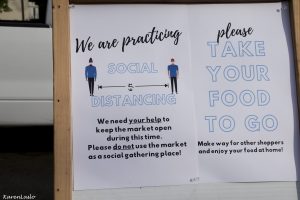
But some vendors have been more able than others to meet the challenges delivered by the pandemic.
Sally Yang said produce sales at her market booth have dropped so sharply in a month that her family is struggling to invest in the seeds they need to plant crops for next year — despite the fact that they’re following public health guidelines. The Yangs and other vegetable vendors now wear masks and gloves and have produce bags ready for quick pickup.
“It’s been really rough,” Yang said. “We’re buying less seeds for now until everything gets back to normal… I’m crossing my fingers, but it’s really scary.”
Yang’s Hmong immigrant family produces winter crops like cilantro, green onions, asparagus and bok choy, and summer crops including cucumbers, peppers and apples.
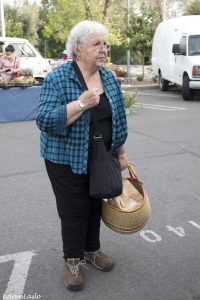
None of the vendors interviewed for this story had been recipients of government programs designed to keep small businesses afloat. Richard Coon, chair of the CCFM board, said he emailed the 100 members with information about the Paycheck Protection Program when the first bundle of loans became available last month.
But Coon realized even then that most of the market vendors run businesses so small they’d have trouble competing for the assistance. And by the time CCFM’s board had voted to apply as an organization, the program funding was entirely depleted.
“A lot of the farmers who grow for the market don’t really have the time to sit on the phone with Chase bank for five hours,” Coon remarked.
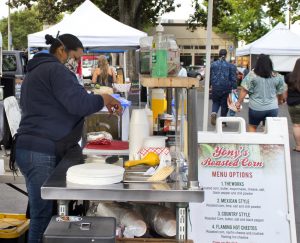
Veronica and Alex Martinez, however, said they applied for an SBA loan but haven’t heard back; meanwhile they’re worried about their food cart business, Yony’s Roasted Corn. They serve elotes – roasted corn on the cob with salsas and dressings, a Mexican street-food specialty.
Their business is off by about 60 percent at the Wednesday and Saturday markets, even as they meticulously follow public health, and more specifically, market guidelines.
After the State of California released the guidelines, CCFM restricted the market to vendors who meet the “essential services” definition. That means there are 17 vendors – potters, jewelry-makers, photographers — who aren’t allowed to participate right now.
An unusual stillness had settled over the market early Saturday as shoppers picked up produce bags and other products and hurried off. Before the pandemic, the parking lot was transformed into a stage for balloon-twisting clowns and violinists, a marketplace where shoppers caught whiffs of lavender soap and fresh cedar planters, an outdoor coffeehouse where customers paused to chat.
Vendors, wearing the required masks and gloves, now set their booths at least 6 feet apart.
Coon says the market is attracting some new shoppers who prefer it to crowded aisles and long lines in grocery stores. “I don’t see crowds as big as they would usually be at this time of year,” he said, “but it also seems like we have lots of new customers who have decided that an open market is safe.”
Coon runs Wookey Ranch, which was busily selling free-range poultry, grass-fed lamb and pork at its booth Saturday. “Our business is almost frantic,” Coon said.
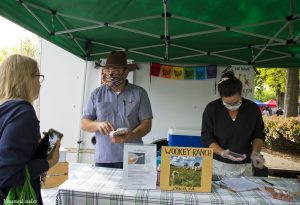
Pyramid Farms’ Matthew Martin said his customer count is down, but he’s selling more produce to customers who are making larger purchases because they no longer dine out. He was interested in an SBA loan, but hadn’t found the time to “get into the bank.”
Businesses that had 500 or fewer employees could apply for forgiveable SBA loans; Coon points out that a business employing 500 people isn’t very small.
“When you set the limit at 500 employees, there’s some pretty big fish in the pond,” Coon said. “I would postulate that any big farm with 500 employees or less that has a bookkeeping department has applied.”
The vendors’ stories illustrate the difficulty small, family-run businesses face in getting assistance. That was one of the problems addressed April 29 in a surprising place – at a national news conference given by Federal Reserve Chair Jerome Powell.
Powell said Congress needs to do much more to protect affected businesses and unemployed people. Just two months ago, he said a strong labor market had been a help to the most vulnerable communities.
“It is heart-breaking, frankly, to see that all threatened now,” Powell said in response to a reporter who asked about the pandemic’s impact on low-income and minority communities. “Everyone is suffering here, but those who are least able to bear it are those who are losing their jobs, losing their incomes, and have little cushion to protect them in times like this.”
While food supply chains around the country collapse, Coon and his board are working to protect this single, small, local supply system. And for vendors not deemed essential during the crisis, they’re preparing poster boards that will remind shoppers that the booths will re-open, perhaps soon.
Michele Miller, who runs a photography, greeting card and jewelry booth, isn’t able to participate now but showed up Saturday to shop. She’s glad CCFM has taken steps that will ensure survival.
“It’s irreplaceable,” Miller said of the market. “It’s a grass-roots way of connecting. You can buy from Amazon, but you’re getting farther and farther away from what we have locally.”
Coon cares about all the small vendors – in fact he says he “worries about them constantly” — and also about ensuring the future of a farmer’s food market.
“Local food is central to a vibrant, local economy,” Coon said. “We all eat.”
Leslie Layton is editor of ChicoSol and a freelance writer.
